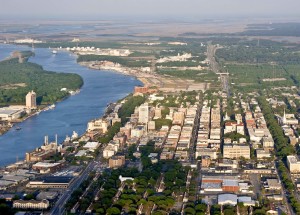 Even though the United States economy lost some ground in the first quarter, Savannah employment and the local economy has remained steady. Not only has it remained steady, but it has actually gained in several areas. The Savannah housing market, for instance, continues to be strong, with Savannah real estate increasing to the point before the slump in 2006. Perhaps the most positive thing is that the growth of the Savannah housing market is not the only thing contributing to the strong Savannah economy. According to Michael Toma, an economics professor at Armstrong State, the first quarter of 2015 was just the latest in seven consecutive quarters where the Savannah economy was on par with the times before the housing market collapse in 2006.
Even though the United States economy lost some ground in the first quarter, Savannah employment and the local economy has remained steady. Not only has it remained steady, but it has actually gained in several areas. The Savannah housing market, for instance, continues to be strong, with Savannah real estate increasing to the point before the slump in 2006. Perhaps the most positive thing is that the growth of the Savannah housing market is not the only thing contributing to the strong Savannah economy. According to Michael Toma, an economics professor at Armstrong State, the first quarter of 2015 was just the latest in seven consecutive quarters where the Savannah economy was on par with the times before the housing market collapse in 2006.
The Savannah economy has largely been spurred to such big gains through port expansion activity, including a number of new jobs, electricity and retail sales, tourism and general Savannah employment growth. The Economic Monitor aligns with Toma in its analysis of trends in the regional economy. The monitor uses data from various official sources, including the U.S. Department of Labor, the Census Bureau, the City of Savannah and sources throughout the counties in the Savannah Metro Area. The coincident and leading index as indicated by the monitor are both on the upswing. These measure current economic conditions as well as a short-term forecast for the region. Both indexes were up by at least one percent over the previous quarter, with the coincident up by 1.3 and the leading by 1.1.
 Toma commented on this increase by saying it shows a moderate, and best of all, sustainable pace of growth. In many ways, this is better than the hot acceleration of the indexes at the end of 2014. The reason these went up at that time was because of consumer expectations in the Savannah housing market, as well as the activity and growth in Savannah employment. The current expansion now has a support system that comes from diverse areas, as opposed to one driven primarily by Savannah real estate. Toma expects housing and labor to continue on their paths of growth, but the other sectors such as tourism, manufacturing and retail are expected to grow right along with them.
Toma commented on this increase by saying it shows a moderate, and best of all, sustainable pace of growth. In many ways, this is better than the hot acceleration of the indexes at the end of 2014. The reason these went up at that time was because of consumer expectations in the Savannah housing market, as well as the activity and growth in Savannah employment. The current expansion now has a support system that comes from diverse areas, as opposed to one driven primarily by Savannah real estate. Toma expects housing and labor to continue on their paths of growth, but the other sectors such as tourism, manufacturing and retail are expected to grow right along with them.
This has positive connotations overall for Savannah real estate, as the market can only get stronger with the support of these other important economic areas. Another area of that market is in new residential homes. Building permits shot up by almost 50 percent over the same period of time last year. The number of new homes approved for construction is the highest number since 2007 at 493. The demand for new homes continues in the Savannah Metro Area, according to the vice-president of Konter Quality Homes. Those working in the banking industry see the same increase in loans for new construction. New retirees and military families are just some of the demographics looking for new construction.
 One important distinction between this housing market growth and the one that created a bubble in the previous decade is that credit is not fueling it. Credit is, of course, much harder to come by than it was back then. That will keep this housing market growth from turning into a bubble and thus, hopefully, from a collapse. Alongside the new construction, demand for already established houses is increasing. It’s quickly turning into a seller’s market as more people seek to move into the Savannah area. Part of this is fueled by the tourism sector, which has showed no signs of slowing down. Hotel bookings are up by about 15 percent from last year and the sector has added about 500 workers.
One important distinction between this housing market growth and the one that created a bubble in the previous decade is that credit is not fueling it. Credit is, of course, much harder to come by than it was back then. That will keep this housing market growth from turning into a bubble and thus, hopefully, from a collapse. Alongside the new construction, demand for already established houses is increasing. It’s quickly turning into a seller’s market as more people seek to move into the Savannah area. Part of this is fueled by the tourism sector, which has showed no signs of slowing down. Hotel bookings are up by about 15 percent from last year and the sector has added about 500 workers.
On top of all that, education and health sectors have added about 100 workers, while business services have added 800. The port continues its strong activity, with an 18 percent increase from last year. Over 100 new jobs have been added in the transportation sector. Manufacturing, which is linked to these sectors, has also added about 300 new jobs. Employment in construction has risen by 15 percent off of its post-recession low. A harsh winter in the east part of the country has not affected consumer spending in Savannah like it did in the rest of the country.
Leave a Reply